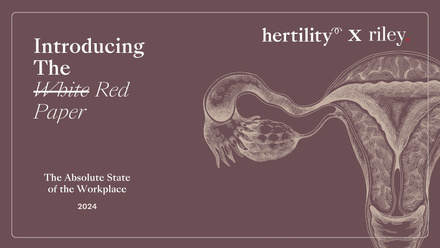A personal journey through the menopause and what employers can do better

My mum died 20 years ago, a long time before I thought to ask her about her journey (I so wish I had), but I remember us laughing when she always got a hot flush at the same point each time driving along the M4, coming over a hill just before a Swindon junction. For me, it's different again. I've not had all 34 symptoms yet, but I'm a good way on in marking them off my menopause bingo card.
Some started so long ago, I didn’t even think about them being related to the menopause. I don’t remember when I finally realised, but I know for sure now I am one of the 9 in 10 women who feel menopause has a negative impact on their working life. I used to be exceptionally resilient, I now feel I’m not. I was always very cheery and positive, but now I’m not. I had a quick brain and excellent memory, but good old brain fog has put an end to that some days. They’re just a few ways my menopause journey impacts me at work – some things me and my colleagues could always depend on have gone.
With things getting harder for me to accept and manage – and knowing some colleagues would be experiencing their own journey – on World Menopause Day I finally decided to see what kind of support we could access at work. Having searched our group intranet for information, I discovered the only references to menopause on the site were the specific exclusion clauses in the company healthcare benefit guide/policy. With a bit of digging, on the EAP site I found a factsheet and video of a webinar from last year in which much of the first 15 minutes is effectively a blank screen. Not a good show!
To me as an employee this simply said menopause is not a real thing. At best, it’s treated as an afterthought but, on the face of it, it’s something that’s positively excluded.
What’s my advice to employers?
Well, for a start…
1. Acknowledge menopause is a real thing.
2. Be clear about who is responsible for providing support. I asked group HR if we could add something about menopause to the group intranet. They said it is up to individual businesses in the group to do it themselves on their intranets. That’s fine, but make sure they know otherwise there’s a cavernous gap.
3. Provide some support, even if it is just to signpost to a few useful websites. Believe me, it can take a long time to build the courage to look for support and the blow when it isn’t there could make things tougher for that person.
4. Encourage employees to help each other. I suggest starting a private channel on Teams (or whatever your platform is) where those who'd like a bit of support at work, or would just like to learn more from colleagues, can chat and share experiences.
5. Ask yourselves whether company benefits are fit for menopause purpose. Through reduced productivity, lost working days (14 million a year according to a 2019 Health & Her survey) and loss of staff (2019 CIPD figures showed almost 900,000 women in the UK left their jobs due to menopause symptoms), menopause is something that can have a big impact on your business as well as your employees.
A few things we’ve shared on our intranet as a start are:
- Menopause Support have a range of really helpful guides, FAQs, videos etc: RESOURCES – menopausesupport.co.uk
- Marie Claire article about perimenopause - a decent brief overview if you're looking for a summary of some of the key facts & things to know: What Davina McCall's perimenopause taught us about the condition (marieclaire.co.uk)
- Davina McCall's excellent documentary from earlier this year: Davina McCall: Sex, Myths and the Menopause - All 4 (channel4.com)
- One for the boys… BBC Radio 5 live - Afternoon Edition - 5 things men should know about the menopause
The author is Suzi Lowther, director of marketing and communications at Punter Southall Governance Services.
This article is provided by Punter Southall Governance Services.
Supplied by REBA Associate Member, Vidett
Leading the way in professional trusteeship & governance







